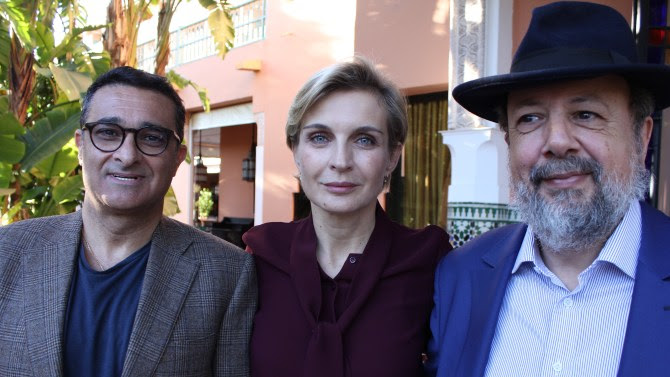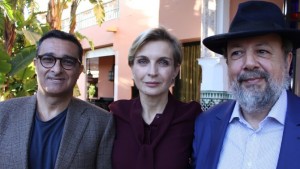VARIETY
Martin Dale, Contributor
Fest director Melita Toscan du Plantier thanks support given by Martin Scorsese.
The 16th Marrakech film fest wraps today, Saturday, with the closing ceremony featuring Fatih Akin’s “Goodbye Berlin” and announcement of the films that will win the Golden Star for best film and the best actor and best actress.
This year’s edition had a very strong world cinema imprint, highly influenced by the country tribute to Russian cinema and the choice of iconoclastic Hungarian filmmaker, Bela Tara, as jury prexy.
The career tributes and masterclasses featured outspoken filmmakers, who have provoked controversy in their home countries and in several cases have moved abroad to maintain their creative independence.
Tarr proudly described himself as one Hungary’s “top five black sheep” and has spent the last five years running his Film Factory school in Sarajevo, Bosnia, where he encourages his students to hunt in order to “capture life” in their films.
Paul Verhoeven, who this week was confirmed as jury president for Berlin 2017, has touted controversy throughout his career. The success and polemics generated by films such as “Spetters” in his native Holland led him to move to Hollywood in the late 1980s. But U.S. pictures such as “Starship Troopers” also generated criticism, and Verhoeven recently revived his career by lensing his first French-language pic, “Elle,” starring Isabelle Huppert.
Paul Haggis is no stranger to controversy, including films such as “In the Valley of Elah” which provided a jaundiced view of the Iraq war at a time when in some parts it was still very popular. Haggis also sees himself as partly an emigré, a Canadian working in the U.S. and now spends an increasing amount of his time in New York. During the festival, he spoke about his forthcoming projects – “Ship Breaker and “Ranger’s Apprentice,” his first major feature film directing gigs since 2007.
Pavel Lungin, one of Russia’s best-known directors, moved to Paris many years ago and his productions have received criticism from both the left and right. He now plans a major production about the gulag labor camp during the Stalin dictatorship.
Japanese director Shinya Tsukamoto, who recently starred in Martin Scorsese’s “Silence” explained how his provocative genre films have been deeply inspired by Scorsese’s work, commencing with the portrayal of the anti-hero in “Taxi Driver.”
Scorsese is seen by many as the godfather of the Marrakech Fest, and he also played a pivotal role in setting up the new ESAV film school in Marrakech. Scorsese is a close friend of Festival director Melita Toscan du Plantier and she explained that he takes a strong interest in each year’s edition, and encourages people to go and helps her contact several potential guests.
Scorsese last visited the fest in 2013 as jury president, but his commitment to world cinema has helped shape Marrakech’s unique atmosphere.
Morocco has been viewed by centuries as a cultural crossroads, that links North and South, East and West. The western kingdom provides access to the Arab world, which stretches out to Asia, and also to the African continent, while providing many bridges to Europe.
Choosing Russia for the country tribute also created a bridge between Europe and Asia in this year’s edition, which was emphasized during the tribute ceremony.
Another important aspect of this year’s edition was a strong focus on the interplay between directors and actors, with several guests talking about how directors can get the best from their actors. Two French actress legends attended this year’s edition – Isabelle Huppert and Isabelle Adjani. Huppert has won three major U.S. best actress awards over recent weeks and is a potential contender for an Academy Award nomination for “Elle.”
Adjani has won more Cesar best actress plaudits than any other French actress and during her career tribute said that great directors are like astronomers, capturing a unique light from the stars that they work with.
Marrakech’s artistic director Bruno Barde, said that “each year’s festival is like a script that I have written. There is a link between everything. This year we find a deep spirit of resistance in the films we’re screening. The films emphasise freedom of choice and the freedom to love. The choice of religion, partner, sexuality, country. The desire of how we want to live our lives.”
Barde considers that under Bela Tarr’s presidency, there was a strong authorial imprint on Marrakech 2016, including the aforementioned helmers and directors such as Bille August, Lisandro Alonso, and Bruno Dumont.
“Over recent years Marrakech has reinforced its positioning as the ‘home of filmmakers’,” he beamed.
The Russian tribute also offered the chance to highlight the achievements of some of the most important directors in the history of cinema, such as Eisenstein, Tarkovsky and Sokurov.
“Russia is a pivotal player on the world stage,” explained Barde. “Russia has a bit of everything. It has given to some of the greatest artists to the world, in the fields of music, painting, literature and cinema. Our vocation at Marrakech is to welcome all cultures. They enrich us. One of the key problems facing the world at present is acceptance of the other – from all parts of the world. Art plays a key role in this process. It shows the path to welcoming others.”
Barde also considers that the Russian tribute marks a landmark moment in the festival’s country tributes and the organizers are now considering other possible modalities, such as a tribute to a key filmmaker – such as Hitchcock, and his disciples, such as Brian de Palma.
Barde considers that although many directors and actors are now migrating towards television series, he still believes that cinema has a greater capacity to say the unsayable.
In terms of cinema, he nonetheless maintains an eclectic approach which includes both mainstream productions and auteur films, as demonstrated by the fact that the new Russian films screened at the fest included Mizguirev’s epic “The Duellist” and Tverdovsky’s “Zoology,” in official competition.
Fest director Melita Toscan du Plantier commented that in addition to the godfather role played by Martin Scorsese, Francis Ford Coppola played a key role in bolstering the festival last year, an edition that took place in the wake of the Paris attacks, with the risk of many cancellations due to the fear of possible terrorism.
Last year’s jury, headed by Coppola, awarded an ex-aequo best film prize to all films in competition. After the closing night ceremony, she said that Coppola spent 10-15 minutes with each director.
Toscan du Plantier observed that the fear of terrorism still lingers in people’s minds and in certain cases can dissuade some people from coming, but that the existence of supporters such as Scorsese and Coppola helps assuage concerns.
“Right from the beginning Martin Scorsese said that this festival should be a celebration of cinema and that we shouldn’t pay people to come as guests. If you have great directors visiting the festival you can get great actors. I maintain my relationship with directors throughout the year. And if you have a friend like Martin Scorsese he can help me by sending out some emails to directors, saying ‘you should go, you’ll love it’, that has made all the difference.”
Toscan du Plantier liaises with the Moroccan authorities throughout the year: “I help foreign producers by putting them into contact with the local authorities for permits.”
The Marrakech Film Foundation’s two vice presidents are Sarim Fassi Fihri, head of the Moroccan Cinema Center, and Faical Laraichi, head of Moroccan pubcaster SNRT.
“A film festival is always a work in progress,” explains Laraichi. “You can never say that you’ve perfected the conception of the festival, that you have reached cruising speed. We will always have to push ourselves. This is our real challenge, to avoid remaining inside a comfort zone.”
Both Laraichi and Fassi Fir explained that the festival offers a window onto the world and a chance to see films that can’t be seen during most of the year. This is important for foreign guests and also for the domestic audience and they consider that the festival has played a key educational function in Morocco.
“Our core philosophy in Morocco is to try to discover other people and let other people discover us, that is the motto of the Marrakech film fest.” Laraichi concluded.
The Marrakech Film Festival has its closing ceremony tonight, Dec. 10.








